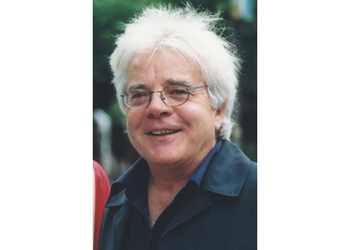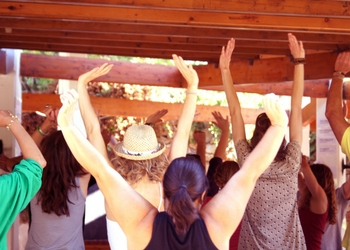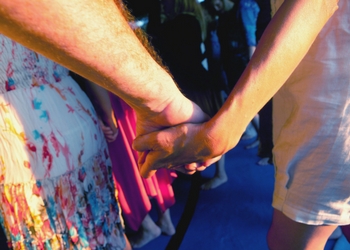Skyros Blog

The road to happiness is supposed to be a personal choice. Yet this choice is made within the economic, social and cultural context we all live, and this context determines our thinking.
Yannis Andricopoulos, co-founder of Skyros, takes a critical view of the choices in front of us and insists, in particular, that happiness has nothing to do with the market economy's obliging suggestions. Don't forget to join in the discussion at the end of the article!
 The Pursuit of Pleasure versus Happiness
The Pursuit of Pleasure versus Happiness
Once, while enjoying a pint of prawns on the terrace of the Steamer Inn, a Shanklin pub on the seafront, I watched all those around me, simple, normal people trying to conquer a mountain masquerading as a hamburger, reprimanding their children for teasing the dog or exchanging jokes while leaking their ice cream cones. The latter were available in whatever flavour they fancied: vanilla, pistachio, strawberry, chocolate or even bacon or garlic – the industry is ready to satisfy every trifling taste. And they all seemed happy and as much at home with the moment as a candle in the local church of Saint Blasius.
Even if sometimes it lasts no longer than an orgasm, happiness, I thought, is not something unattainable.
But happiness demands something more substantial than an ice cream. It demands primarily the satisfaction of our basic needs, a challenging activity, a meaningful job into which we can put our heart and a sense of purpose – goals that inspire us and guide our path in life. Goals, whatever they are, Aristotle tells us, cannot, however, be ends in themselves. They are only a means to an end: the attainment of happiness, eudaemonia.
Eudaemonia - The Attainment of Happiness - Is The Ultimate Goal
 Defining eudaemonia in Aristotle’s terms is a very challenging task. Eudaemonia, he said, is reached if life is lived in accordance with areté. Somehow inexact and uncertain and also poorly translated as virtue, areté involves the active exercise of the soul’s faculties in the pursuit of moral, intellectual and physical excellence. In this, it is guided by Logos. Again poorly translated in English as Reason, Logos is the voice of everything, visible and invisible, finite and infinite, ephemeral and eternal. Rooted in the subconscious, it is accessible through our intellect, instinct, feelings and intuition.
Defining eudaemonia in Aristotle’s terms is a very challenging task. Eudaemonia, he said, is reached if life is lived in accordance with areté. Somehow inexact and uncertain and also poorly translated as virtue, areté involves the active exercise of the soul’s faculties in the pursuit of moral, intellectual and physical excellence. In this, it is guided by Logos. Again poorly translated in English as Reason, Logos is the voice of everything, visible and invisible, finite and infinite, ephemeral and eternal. Rooted in the subconscious, it is accessible through our intellect, instinct, feelings and intuition.
Happiness in the Aristotelian sense is, thus, a state of inner fulfillment reached in the pursuit of perfection. It is the affinity of what Heraclitus called the ‘soul-fire’ with the cosmic fire outside in the context of something larger than ourselves and also in tune with Logos, the voice of the universe. Thomas Acquinas understood it as the pure bliss of union with God.
As such, dependent neither on particular things nor on circumstances, eudaemonia is a steady and constant state in which we are happy even when misfortune hits our door. In that state we will be able to bear adversity with serenity, dignity and even pride. A virtuous person, Cicero said, ‘will be happy even on the torture rack’. The same was the meaning of Wittgenstein’s last words – ‘tell them it was wonderful’, uttered after a life of more pain than most people experience.
This is exactly what is evident in the life of so many people from Rosa Luxemburg, Martin Luther King and Mother Teresa to millions of others whose names history, too busy with the chronicling of crimes, has just failed to record.
Pleasure is Not Identical to Happiness
It follows that without access to the commands of our better selves, the most we can expect in life is contentment provided by the number of goals Man United has scored or through a succession of little Click and drag to moveinfusions of pleasurable activities: a shopping expedition, a nice dinner in a fancy restaurant, a drinking spree or just a good film on our TV screen. But pleasure is not identical to happiness. And choosing pleasure over happiness, Aristotle said, is certainly a very poor choice. It reflects poor values.
Yet riding on the back of a culture which thrives on endless wealth creation, manufactured needs and frivolous concerns this is what we seem to go for. The choice leads inevitably to frustration, dissatisfaction, discontent and an aggressiveness that seems to feed on bulls’ testicles pies. It forces us to work harder, lose sight of our humanity and experience at the end a spiritual emptiness from which drugs or alcohol provide no escape. Hence all the chill of our invisible realities that have entered inaudibly and irrevocably into our lives and the ensuing unhappiness which wealth can bedight in Karl Lagerfeld’s latest Spring Couture collection but cannot eradicate.
 Pursuit of Excellence in all Fields of Human Endeavour
Pursuit of Excellence in all Fields of Human Endeavour
Exploring their values, determining their goals or just working out the meaning and purpose of life becomes at the end a luxury, most people, those living on take-away happiness, cannot afford. But if the dream of the good life, eudaemonia, becomes subsumed into the callousness of reality, this has less to do with the individual and more with our economic, social and cultural realities as they are determined by the market.
Yet, whatever our realities dictate, the goal should be eudaemonia, the pursuit of excellence in all fields of human activity in tune with the dictates of our conscience, the requirements of Beauty and Love, which are one and the same thing, and the rules of Justice decreed by the silent, immutable laws of the universe's Nous. Cosmic morality, which makes sure that the night will never violate the rights of the day, nurtures no hierarchies, despotic institutions or structural subordination and domination.
The cynics may, of course, dismiss these thoughts as gibberish, the brainchild of an ‘intellectual’ detached from our world and our ‘real’ needs. Their approach will not, however, make it easier for them to work out why, despite their affluence, position or all the ‘fun’ they have in their lives, happiness remains for them as inaccessible as the Holy Grail.
Skyros is Based on Ancient Greek Ideals
Skyros holidays are based on the pursuit of a life that is ‘beautiful and honourable’. The context is physical, moral and intellectual excellence in tune with the ethical requirements of the community. The distinction between mind and body is not there, balance, proportion and symmetry rule the day's schedule and the life of the individuals is inseparable from the life of their community. The community, in turn, is expected to run its affairs efficiently, and, in doing so, stimulate the intellect and satisfy the spiritual aspirations of its members.
In this context people are encouraged to be their true selves, explore their potentials and seek fulfillment in what they really value. In the process something changes, sometimes even radically. People return home with new ideas close to their dreams and aspirations, powerful new bonds and connections, and a renewed confidence in themselves and their capabilities. It's what gives a new meaning to their lives. But this is also their gift to their partners, friends and colleagues.
What are your views on Pleasure versus Happiness? Share your thoughts and feedback in the space below. Really looking forward to seeing your comments and continuing the discussion here!










Comments
There are no comments yet. Why not be the first?